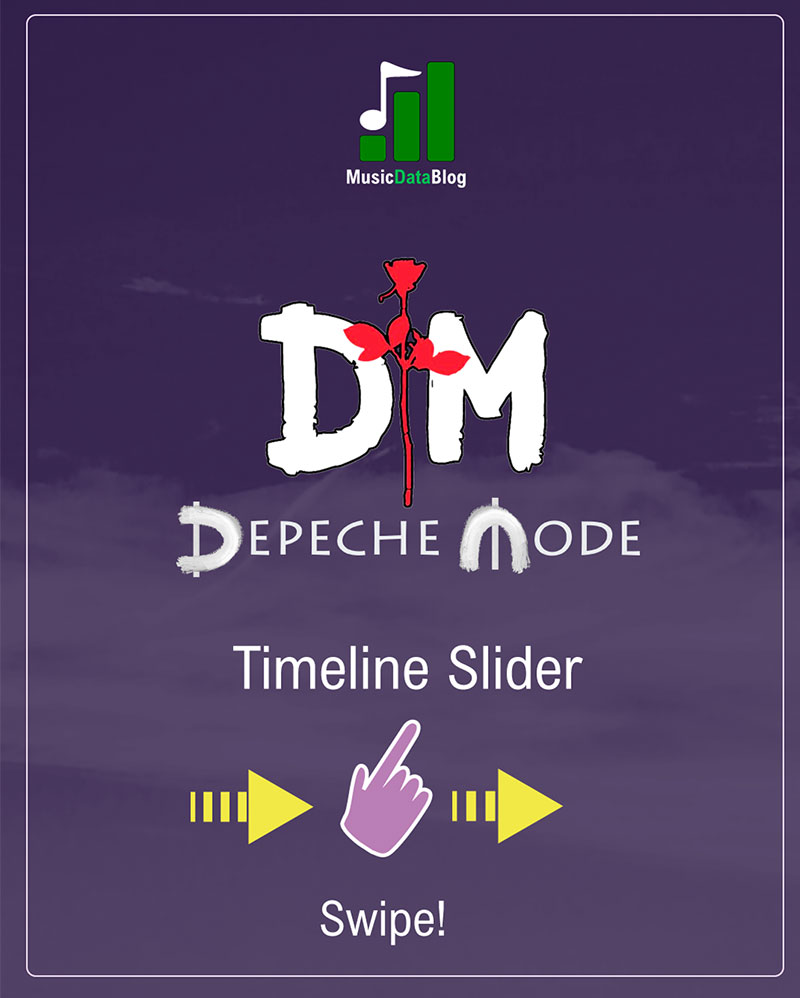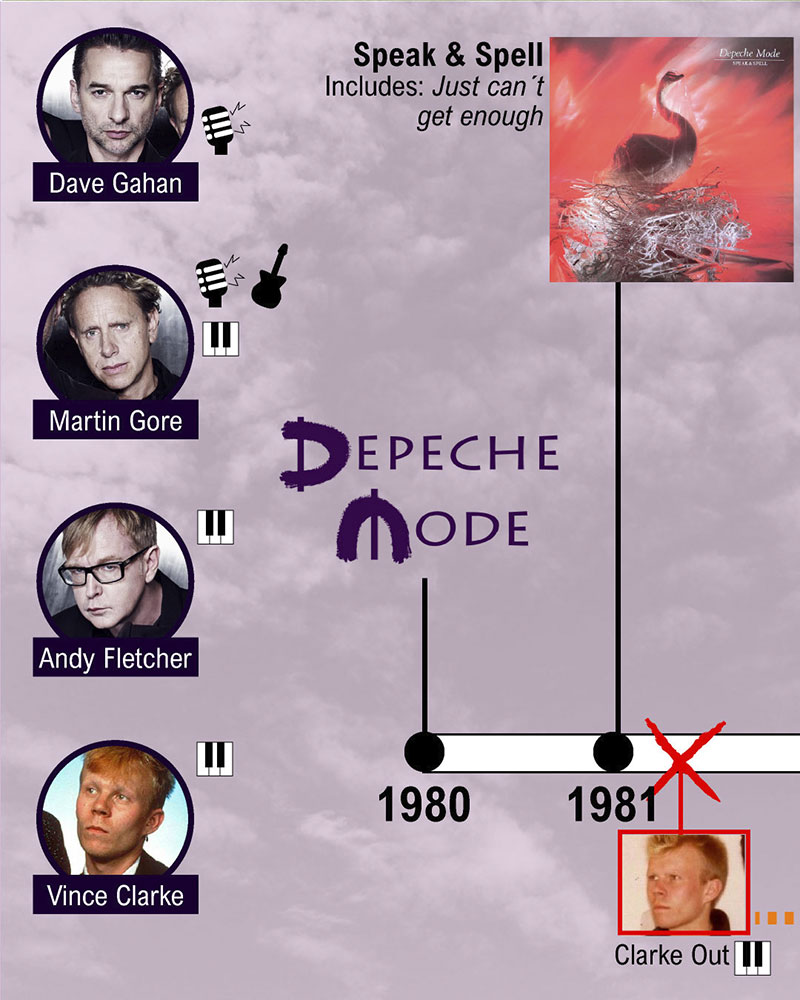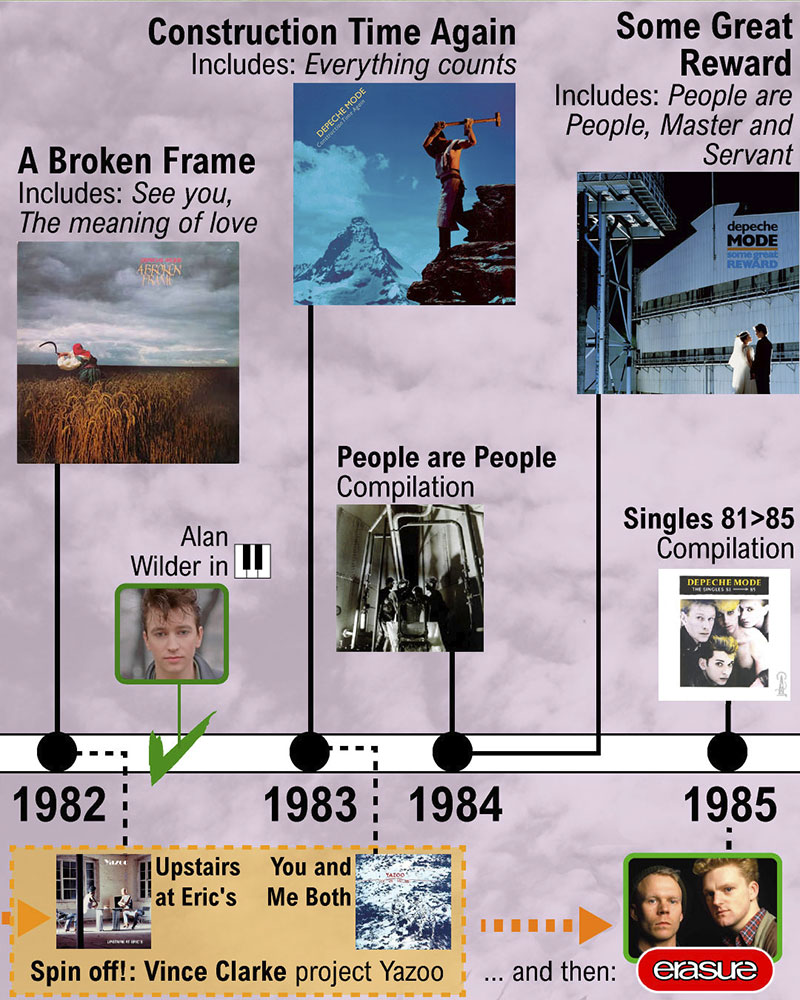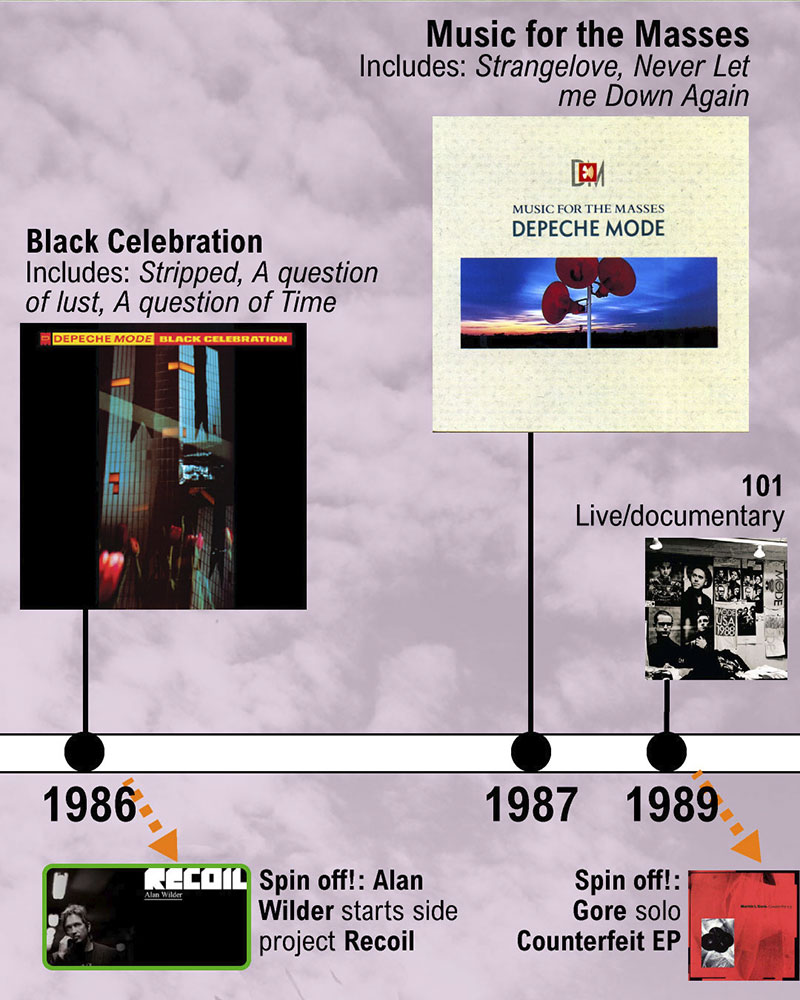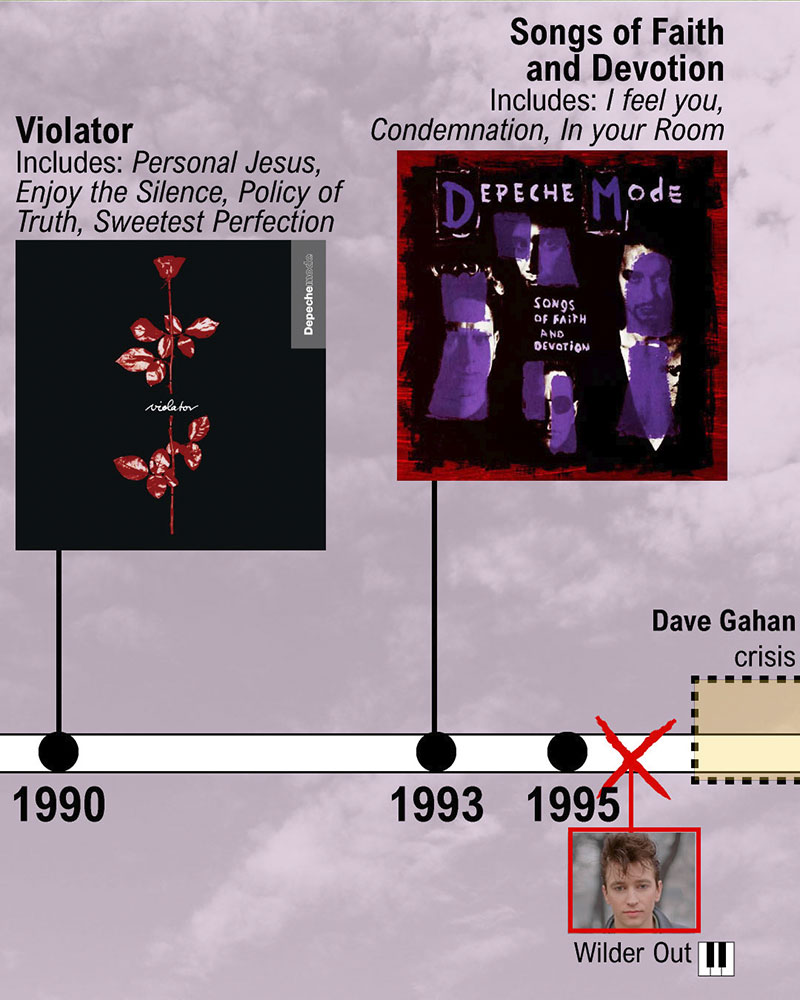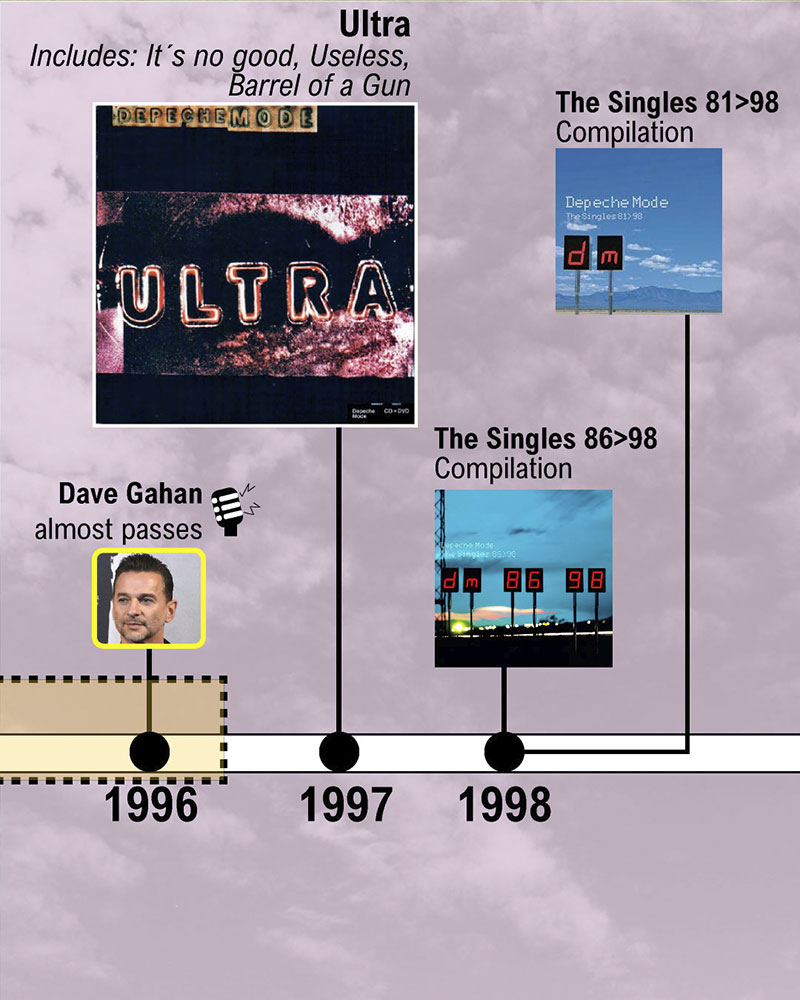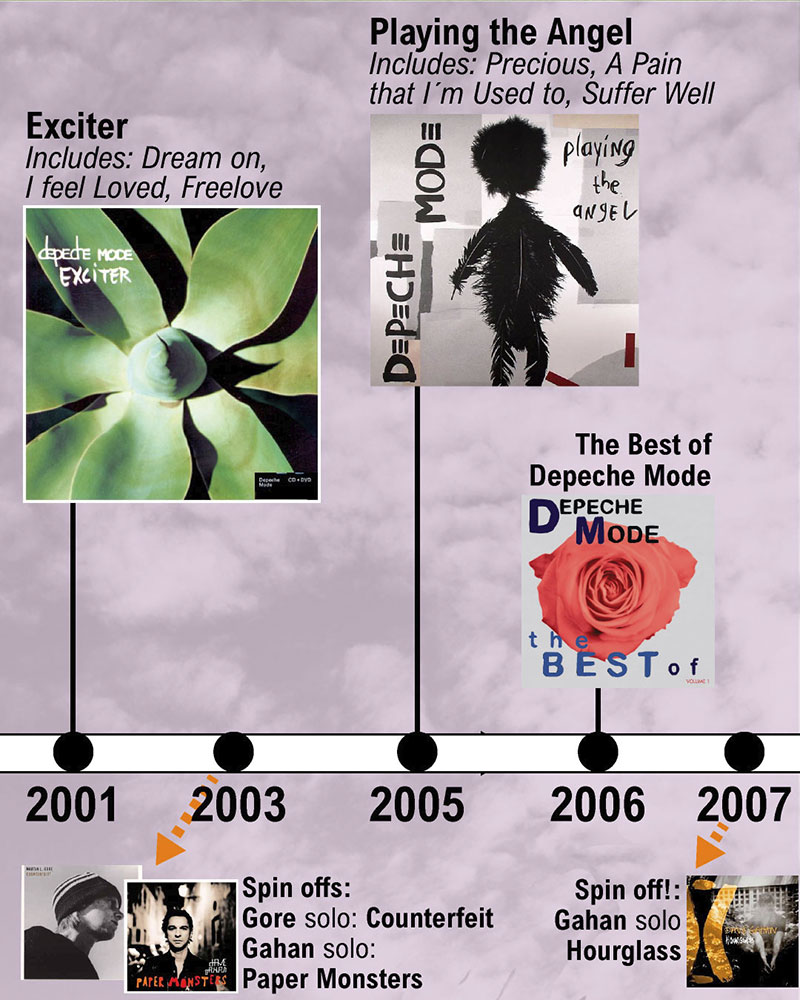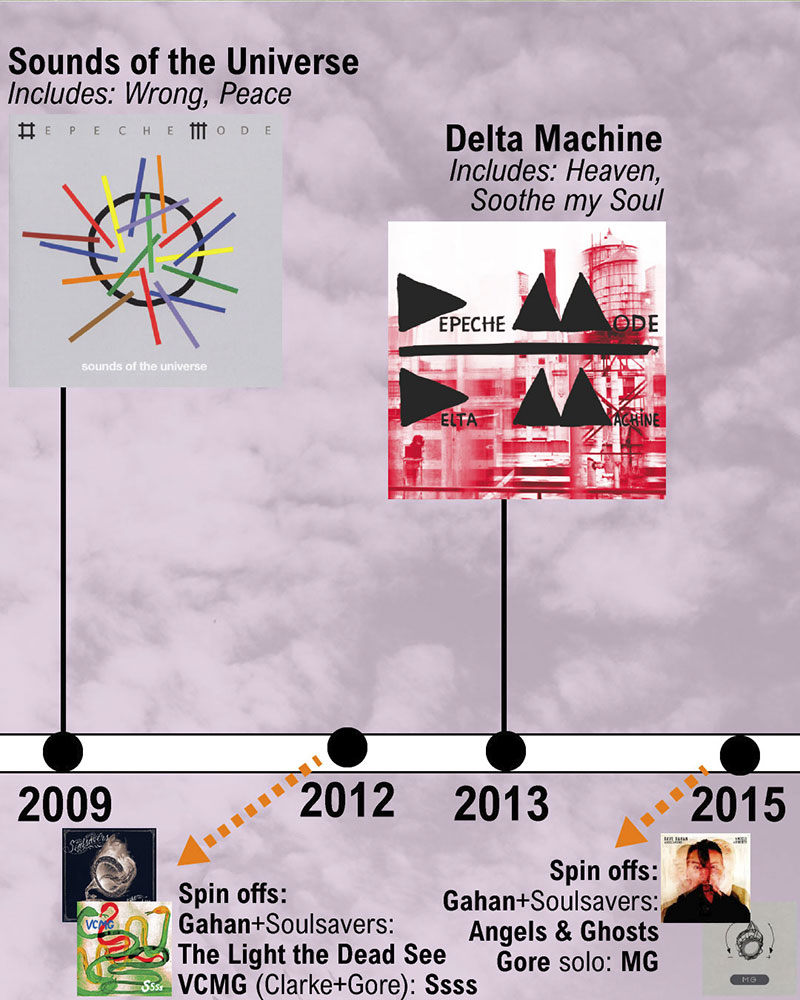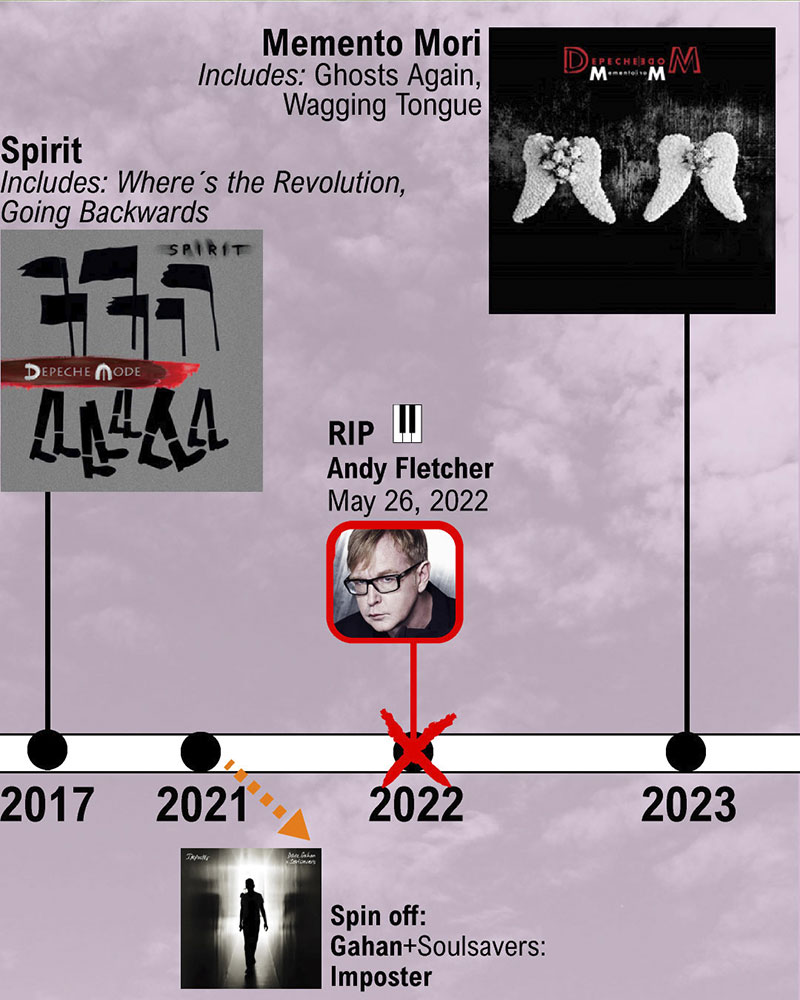Depeche Mode is one of the most influential and successful electronic bands of all time. Since their formation in 1980, they have released 15 studio albums, sold over 100 million records worldwide, and influenced countless artists across genres.
In this blog post, we will explore Depeche Mode’s history through their recording career, highlighting their musical evolution, their lineup changes, and their solo and side projects.
It is worth noting that Depeche Mode recently released its newest album, Memento Mori in 2023. This is their first since the passing of founder member Andy Fletcher, in 2022.
The Early Years (1980-1982)
Depeche Mode’s origins date back to 1977, when schoolmates Vince Clarke and Andy Fletcher formed a band called No Romance in China, with Clarke on vocals and guitar and Fletcher on bass. Later, they joined forces with Martin Gore, who played guitar in an acoustic duo called Norman and the Worms, and Dave Gahan, who was a singer in a local band called The Vermin. They initially called themselves Composition of Sound, but changed their name to Depeche Mode after seeing a French fashion magazine with that title.
Depeche Mode signed with Mute Records in 1980 and released their first single, Dreaming of Me, in February 1981. It was followed by New Life and Just Can’t Get Enough, which became their first UK Top 10 hits. Their debut album, Speak & Spell, was released in October 1981 and showcased their synth-pop sound influenced by bands like Kraftwerk, The Human League, and OMD. The album was produced by Daniel Miller, the founder of Mute Records, who also played synthesizer on some tracks.
However, shortly after the release of Speak & Spell, Vince Clarke announced his departure from the band. He was unhappy with the direction of the band’s music and wanted to pursue his own projects. He later formed Yazoo with Alison Moyet, Erasure with Andy Bell, and The Assembly with Eric Radcliffe. He also wrote and produced songs for other artists like The Assembly, Alison Moyet, Robert Marlowe etc.
Depeche Mode decided to continue as a trio, with Martin Gore taking over as the main songwriter. They recorded their second album, A Broken Frame, in 1982, with Gore also playing keyboards and guitar. The album was darker and more experimental than Speak & Spell, reflecting Gore’s personal influences like David Bowie, Brian Eno, and Joy Division. The album spawned singles like See You, The Meaning of Love, and Leave in Silence.
The Alan Wilder Era begins (1983-1995)
In 1982, Depeche Mode recruited Alan Wilder as a touring keyboardist to replace Vince Clarke. Wilder had previously played with bands like The Hitmen and Dafne & The Tenderspots. He soon became a full-time member of Depeche Mode and contributed to their third album, Construction Time Again (1983). The album marked a significant change in their sound, as they incorporated industrial elements like sampling and tape loops. They also worked with producer Gareth Jones for the first time. The album featured singles like Everything Counts, Love In Itself,
and Get the Balance Right.
Depeche Mode’s fourth album, Some Great Reward (1984), continued their musical experimentation and explored themes like sexuality, religion, and politics. The album was recorded at Hansa Studios in Berlin, where bands like U2 and David Bowie had also worked. The album included songs like People Are People (their first US Top 40 hit), Master and Servant (a controversial song about BDSM), Blasphemous Rumours (a song about God’s cruelty), and Somebody (a ballad sung by Martin Gore).
Depeche Mode’s popularity grew steadily throughout the mid-1980s, as they toured extensively around the world and gained a loyal fan base. They also released two live albums: 101 (1989), which documented their concert at the Pasadena Rose Bowl in front of 60,000 people; and Devotional (1993), which captured their performances during the Songs of Faith and Devotion tour.
In 1986, Depeche Mode released their fifth studio album, Black Celebration, which marked a darker and more industrial direction for the band. The album spawned four singles: “Stripped”, “A Question of Lust”, “A Question of Time” and “But Not Tonight”. The band also collaborated with photographer Anton Corbijn, who became their long-time visual director and created many of their iconic images and videos.
Depeche Mode’s breaktrough (1987-1993)
The band’s next album, Music for the Masses, was released in 1987 and further expanded their sonic palette with more orchestral and acoustic elements. The album included the singles “Never Let Me Down Again”, “Strangelove”, “Behind the Wheel” and “Little 15”. The album was supported by a massive tour that culminated in a concert for 70,000 people at the Pasadena Rose Bowl, which was dubbed “the concert for the masses”.
In 1990, Depeche Mode released their most successful album to date, Violator, which catapulted them to global stardom. The album featured the hit singles “Personal Jesus”, “Enjoy the Silence”, “Policy of Truth” and “World in My Eyes”. The album was praised by critics and fans alike for its blend of catchy melodies, dark lyrics and innovative production. The album sold over 15 million copies worldwide and was ranked among the best albums of all time by various publications.
The band’s follow-up album, Songs of Faith and Devotion, was released in 1993 and marked a radical departure from their previous sound. The album incorporated more rock and gospel influences, as well as live drums and guitars. The album was also influenced by the personal struggles of the band members, especially lead singer Dave Gahan, who battled with drug addiction and attempted suicide. The album spawned the singles “I Feel You”, “Walking in My Shoes”, “Condemnation” and “In Your Room”. The album topped the charts in both the UK and the US, but also caused tensions within the band.
In 1995, after completing the Devotional Tour, which was marred by illness, injury and cancellations, keyboardist Alan Wilder announced his departure from Depeche Mode, leaving the band as a trio. Wilder cited creative differences and lack of recognition as his reasons for leaving. He later pursued his own musical project, Recoil.
The band and Dave Gahan surviving their own fame (1996-2005)
The remaining members of Depeche Mode took a break from music and focused on their personal lives. In 1996, Gahan entered a rehabilitation program to overcome his drug addiction. Gore also dealt with alcoholism and depression. Fletcher suffered a nervous breakdown and was diagnosed with clinical depression.
In 1997, Depeche Mode returned with studio album number nine, Ultra, which was produced by Tim Simenon. The album featured guest musicians such as former Can member Jaki Liebezeit, former Smashing Pumpkins guitarist James Iha and violinist Jane Scarpantoni. The album included the singles “Barrel of a Gun”, “It’s No Good”, “Home” and “Useless”. The album received positive reviews from critics and fans, who praised its maturity and diversity.
In 2001, Depeche Mode released their tenth studio album, Exciter, which was produced by Mark Bell of LFO. The album featured a more minimalist and organic sound than their previous albums. The album spawned the singles “Dream On”, “I Feel Loved”, “Freelove” and “Goodnight Lovers”. The album received mixed reviews from critics, who praised its experimentation but criticized its lack of cohesion.
In 2005, Depeche Mode released their eleventh studio album, Playing the Angel, which was produced by Ben Hillier. The album marked a return to a more synth-based sound, while also incorporating some blues and rock elements. The album featured three songs written by Gahan, who had started his solo career in 2003 with his debut album Paper Monsters. The album included the singles “Precious”, “A Pain That I’m Used To”, “Suffer Well” and “John the Revelator / Lilian”. The album received positive reviews from critics and fans.
Depeche Mode’s recent years
In 2006, Depeche Mode released a compilation album called The Best of Depeche Mode Volume 1, which featured 18 of their most popular songs from their entire career, as well as a new track called “Martyr”. The album was accompanied by a DVD that contained all of their music videos up to that point. The band also embarked on a world tour to promote the album, playing 85 shows in 40 countries.
In 2009, Depeche Mode released their 12th studio album, Sounds of the Universe, which was produced by Ben Hillier, who also worked on Playing the Angel. The album debuted at number one in 21 countries and received positive reviews from critics. The lead single, “Wrong”, was nominated for a Grammy for Best Short Form Music Video. The band also launched another world tour, which was interrupted by Dave Gahan’s illness and surgery. The tour resumed in June 2009 and ended in February 2010.
In 2013, Depeche Mode released their 13th studio album, Delta Machine, which was co-produced by Ben Hillier and Flood, who had previously worked with the band on Violator and Songs of Faith and Devotion. The album received mixed reviews from critics, but was a commercial success, reaching number one in 12 countries. The lead single, “Heaven”, was accompanied by a video directed by Tim Saccenti. The band also embarked on another world tour, called The Delta Machine Tour, which lasted from May 2013 to March 2014 and included 107 shows in 32 countries.
In 2017, Depeche Mode released their 14th studio album, Spirit, which was produced by James Ford, who had worked with bands like Arctic Monkeys and Florence and the Machine. The album was praised by critics for its political and social themes and its dark and electronic sound. The lead single, “Where’s the Revolution”, was a call to action against the rise of populism and authoritarianism in the world. The band also started another world tour, called The Global Spirit Tour, which lasted from May 2017 to July 2018 and included 130 shows in 40 countries.
In 2020, Depeche Mode were inducted into the Rock and Roll Hall of Fame, along with other artists like Nine Inch Nails, Whitney Houston and The Notorious B.I.G. The band also released a documentary film called Spirits in the Forest, which followed six fans from different backgrounds and countries as they attended their concerts during the Global Spirit Tour. The film was directed by Anton Corbijn, who had been collaborating with the band since the mid-1980s.
Andy Fletcher’s death & Memento Mori
In 2021, Depeche Mode announced that they were working on their 15th studio album, tentatively titled Memento Mori (Latin for “remember that you will die”), which was expected to be released in early 2023. The band also revealed that they had reunited with Alan Wilder (production), who had left the band in 1995 after being a member for more than a decade. The band said that they wanted to explore new musical directions and experiment with different sounds and styles.
In 2022, tragedy struck when Andy Fletcher (keyboards) died unexpectedly from a heart attack at his home in London. He was 61 years old. The band issued a statement expressing their shock and grief over his loss and said that he was an integral part of Depeche Mode’s history and legacy. They also said that they would dedicate their upcoming album to his memory and honor his contribution to their music.
In 2023 (present), Depeche Mode released their new album Memento Mori (Columbia), which was met with critical acclaim and commercial success. The album featured 12 songs that dealt with themes of mortality, spirituality, love and hope. The lead single, “Alive”, was a tribute to Andy Fletcher and a celebration of life. The band also announced that they would go on one last tour, called The Final Tour, which would start in May 2023 and end in December 2023, marking the end of their 42-year career as one of the most influential and enduring bands in the history of electronic music.
Depeche Mode’s albums ranked according to their Spotify popularity

